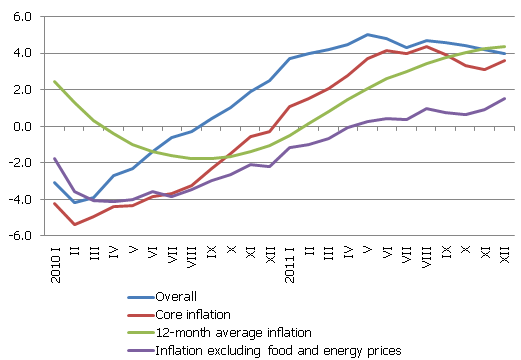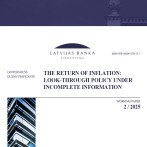Inflation in 2011 in Latvia: result of taxes and global prices
The average consumer price level in December of 2011 remained unchanged, whereas the annual inflation, i.e. consumer price levels compared to December 2010 dropped to 4.0%. The main contributor was the diminished impact of the prices of fuel and unprocessed foods. The average rise in consumer prices by 4.4% observed in 2011 was mostly related to the impact of indirect taxes as well as global energy resource and food prices.
Even though in December turmoil resumed in the oil producing countries of Middle East and the second half of the month saw a rise in fuel prices their monthly average was 1.3% lower than in November. Meanwhile, in several groups of tradable goods (e.g., wearing apparel and footwear, several groups of household goods) a drop in prices was observed last month. Already before Christmas mid-season discounts were offered in points of trade, turning into seasonal discounts slightly earlier than usual. If such campaigns are frequent, they can indicate an insufficient demand because of which the annual average of core inflation, which does not include the most characteristic sides of supply and groups of goods impacted by external factors (unprocessed foods, regulated prices and fuel), is lower than overall inflation (3.1%), even if such domestic factors as the impact of indirect taxes on prices are taken into account. Compared to November, the consumer prices in the groups of goods and services characteristic of core inflation rose by a total of 0.3% in December. That could be related to additional demand in the holiday season, because irrespective of the drop in the prices of unprocessed foods, the prices of processed foods rose as did those of alcoholic beverages, tobacco and services of the catering industry.
Main inflation indicators

Source: CSP, BoL calculations
The drop in annual inflation in December was primarily determined by the base effect of the prices of fuel and unprocessed foods: in the corresponding period of the previous year these prices grew much faster. Meanwhile, the period of high base for the prices of compensated medications ended and that increased the impact of regulated prices on the annual inflation.
Even though the global factors preclude a substantial drop in 2012 in such price groups as food and oil products, their prices are unlikely to continue to rise rapidly. Tensions in the oil producing countries of the Middle East have not been resolved, yet global consumption, the debt crisis of the European countries notwithstanding, is growing gradually because of the stable growth in other regions of the world, particularly in Asia. That means that the impact of the above factors will not express itself so sharply also in the price trends in Latvia and will translate into a substantially lower inflation this year. Moreover, the impact of the problems of the European countries affected by the debt crisis is inflation-reducing. Slower global and Latvian economic growth as compared to the rates in 2011 create a smaller pressure on prices both in Latvia and Latvia's main trading partners. The appreciation of natural gas and heating energy will be an inflation-supporting factor, for the high level of the prices of heavy oil observed in mid-2011 has substantially pushed up the 9-month average indicator to which these tariffs are pegged, albeit with a certain delay. It can therefore be expected that the average annual inflation this year will drop to 2.4%, as predicted previously.
Textual error
«… …»






